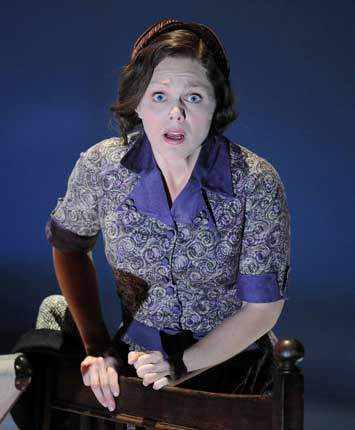The Turn of the Screw, Glyndebourne, Lewes

It's not only the narrative tension that turns on interlocking screws in Glyndebourne's production of Britten's claustrophobic masterpiece.
So, too, does everything on stage: the floor consists of concentric circuits that make chairs appear to move unaided and the spectre of Miss Jessel to glide away in the best ghostly fashion. The windows turn, too, turning the haunted house inside out, and with all of this turns the Governess's mind, and our own.
Where better than Glyndebourne itself as the setting? The home movie at the start was filmed in the gardens. When you emerge at half time it's as if you're in the opera, and this is not a comfortable opera to be in. Jonathan Kent's staging perhaps falls slightly short of the intense detail and consistency of David McVicar's for English National Opera. Since the two opening scenes use film projections to great effect, and Peter Quint in the prologue toys with Miles's red-sailed boat, it seems odd that neither idea is followed through later. Still, it's spectacular nonetheless, aided by extra twists of ambiguity as the apparent domestic cosiness – standard lamps, comfy armchairs, a Christmas tree and apparently normal, high-spirited games – makes the drowning of the children's "ceremony of innocence" by the ghosts that perch on their beds even more agonising.
And what a cast. Miah Persson, the rising soprano of the moment, is an ideal Governess, as pure in tone as in spirit. The unquenchable Susan Bickley, fresh from her much-deserved accolade at the Royal Philharmonic Society Awards, is Mrs Grose, the housekeeper, matching Persson notch for notch in character, power and diction. They need to be strong to face these ghosts: the charm of Toby Spence's stage presence and the range of his ever-more magnificent voice – travelling effortlessly from persuasive whisper to ferocious possession – make Peter Quint all too believable, while as the drowned Miss Jessel, Giselle Allen is a radiantly horrible queen of tragedy. In the pit, the London Philharmonic under the baton of Jakub Hrusa is transformed into a virtuoso chamber ensemble.
It's quite a line-up for the children to match, but Joanna Songi's Flora offers both vocal beauty and bite, and as Miles – the inevitable Britten boy, veering between angel and demon – Thomas Parfitt is focused and heart-rending.
Join our commenting forum
Join thought-provoking conversations, follow other Independent readers and see their replies
Comments
Bookmark popover
Removed from bookmarks